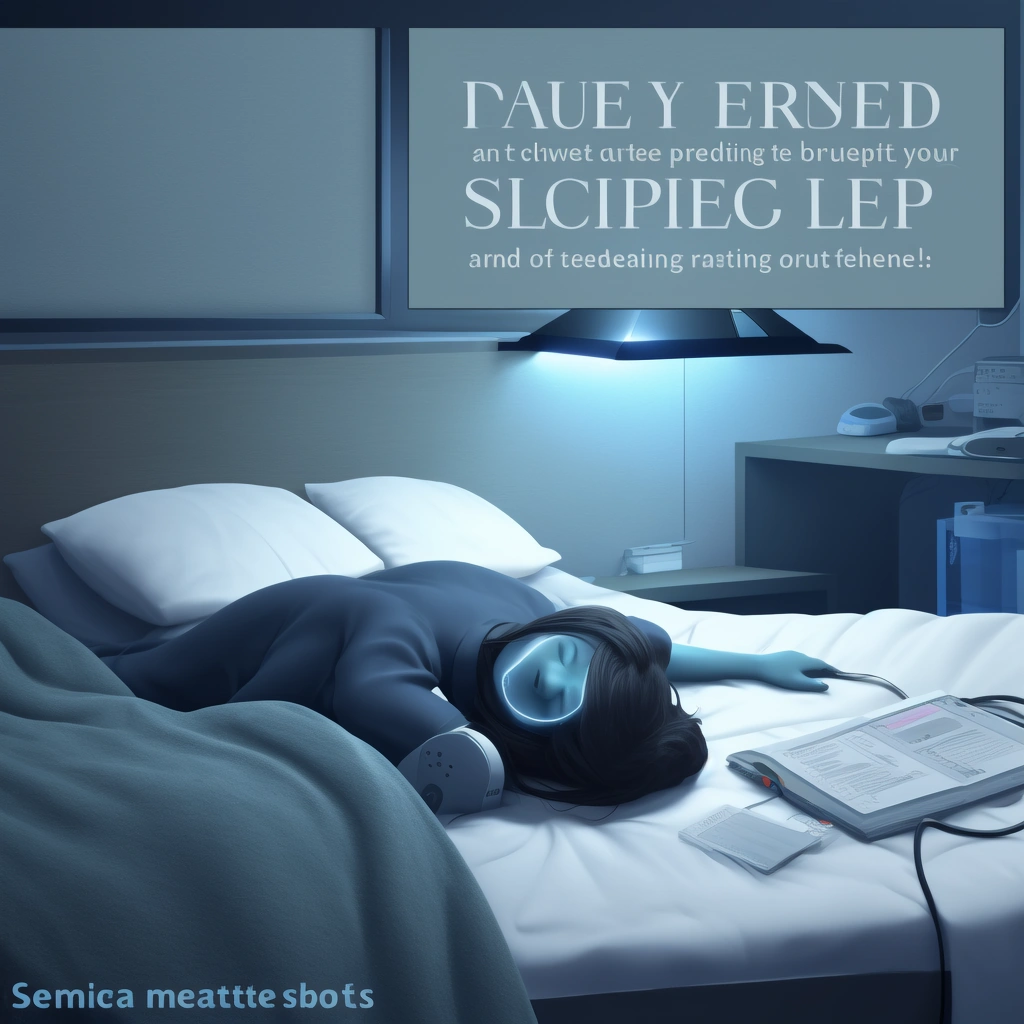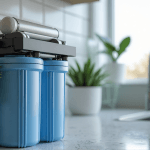Optimizing Your Sleep: A Deep Dive into Advanced Sleep Technology
Introduction: The Future of Sleep is Here
Unlocking the secrets to truly restful sleep is a pursuit many of us embark on, and in today’s fast-paced world, quality sleep is no longer a luxury but a fundamental necessity for optimal health and well-being. This guide delves into the cutting-edge realm of advanced sleep technology, exploring how innovations in premium mattresses, smart pillows, and sleep tracking devices are revolutionizing the way we approach our nightly rest. These advancements are not just about comfort; they represent a significant leap in our understanding of sleep science and how we can leverage technology to enhance our sleep quality and overall health. The journey toward better sleep is now more accessible and data-driven than ever before, and this exploration will help you navigate the available options to find the best solutions for your individual needs.
The modern sleep landscape has been transformed by the advent of sophisticated sleep technology. Premium mattresses, for instance, have moved far beyond basic innerspring designs. We now see advanced constructions featuring materials like memory foam, known for its pressure-relieving properties, and latex, which offers a more responsive and durable alternative. Hybrid mattresses combine the benefits of multiple materials, often pairing the support of innersprings with the comfort of foam or latex layers. Furthermore, many of these mattresses incorporate cooling technologies, such as gel infusions and breathable fabrics, to combat the common issue of overheating during sleep. These features are not merely marketing buzzwords; they are the result of extensive research and development aimed at optimizing sleep environments.
Smart pillows represent another exciting frontier in sleep technology, offering personalized comfort and intelligent sleep monitoring capabilities. These pillows often feature adjustable firmness levels, allowing users to customize their support based on their preferred sleep position and individual needs. Some smart pillows also incorporate temperature regulation technologies, ensuring a comfortable sleeping climate throughout the night. Beyond comfort, many smart pillows now include integrated sleep tracking sensors that monitor sleep stages, movement, and even heart rate variability. This data provides valuable insights into your sleep patterns, allowing you to make informed adjustments to your sleep routine and environment. This integration of comfort and data is a key aspect of modern sleep technology.
Sleep trackers, ranging from wearable wristbands to bedside monitors, play a crucial role in providing data-driven insights into our sleep patterns. These devices collect a wealth of information, including the duration and quality of sleep, the time spent in different sleep stages (light, deep, REM), heart rate, and movement. This data is often presented in user-friendly apps, allowing individuals to track their progress and identify potential issues. For example, consistent data showing fragmented sleep or low deep sleep percentages can indicate the need for changes in sleep habits or environment. These devices empower users to take a proactive approach to sleep optimization, moving beyond subjective feelings of rest to objective data analysis. Understanding the nuances of sleep stages and physiological responses is crucial for maximizing restorative sleep and improving overall health.
Ultimately, the integration of these advanced sleep technologies is about more than just achieving a good night’s sleep; it’s about optimizing our overall health and well-being. By understanding the features and benefits of premium mattresses, smart pillows, and sleep trackers, you can make informed decisions about which products are best suited to your individual needs. These tools, when used correctly, can help you achieve the restorative sleep necessary for optimal physical and cognitive function. Investing in advanced sleep technology is an investment in your overall health and productivity, allowing you to wake up feeling refreshed, revitalized, and ready to take on the day.
Premium Mattresses: A Foundation for Better Sleep
Premium mattresses represent a cornerstone of achieving restorative sleep, acting as the very foundation upon which your nightly rejuvenation is built. They go beyond mere comfort, playing a crucial role in spinal alignment, temperature regulation, and pressure point relief. This section delves into the diverse world of premium mattresses, exploring the materials, construction techniques, and innovative technologies that set them apart. From the contouring embrace of memory foam to the buoyant responsiveness of latex and the balanced support of hybrid designs, there’s a premium mattress tailored to every individual’s sleep profile. Memory foam mattresses, known for their ability to conform to the body’s curves, offer exceptional pressure relief and motion isolation, making them ideal for side sleepers and couples. However, traditional memory foam can sometimes trap heat. Advancements in cooling technology, such as gel infusions and open-cell structures, address this issue, creating a more breathable and temperature-neutral sleep surface. For example, mattresses incorporating copper infusions or graphite layers are designed to draw heat away from the body, promoting cooler sleep. Latex mattresses, derived from natural or synthetic rubber, provide a resilient and responsive sleep surface. They offer excellent support and bounce, making them a popular choice for back and stomach sleepers. Natural latex is also hypoallergenic and antimicrobial, appealing to those with sensitivities. Hybrid mattresses combine the best of both worlds, typically integrating a support core of pocketed coils with comfort layers of memory foam, latex, or other materials. This combination provides the conforming comfort of foam with the enhanced support and breathability of coils. The construction of a premium mattress plays a vital role in its performance. Pocket coil systems, where each coil is individually encased, minimize motion transfer and offer targeted support. Zoning, where different coil gauges are used in specific areas of the mattress, provides customized support for different parts of the body, such as firmer support for the lumbar region and softer support for the shoulders and hips. This tailored approach enhances spinal alignment and reduces pressure points. Cooling technologies are another key aspect of premium mattress design. Beyond gel infusions and open-cell foams, features like breathable covers and phase-change materials work to regulate temperature and create a comfortable sleep environment. Investing in a premium mattress is an investment in your long-term health and well-being. By understanding the different materials, construction techniques, and cooling technologies available, you can choose a mattress that optimally supports your sleep posture, reduces pressure points, and promotes a deeper, more restorative sleep experience. Consider your individual sleep preferences, body type, and any specific needs, such as allergies or back pain, when selecting a premium mattress. Consulting with sleep specialists or healthcare professionals can also provide valuable guidance in finding the perfect mattress for your unique requirements. Ultimately, the right mattress will contribute significantly to improved sleep quality, enhanced energy levels, and overall better health.
Smart Pillows: Personalized Comfort and Intelligent Sleep
Smart pillows represent a significant leap forward in sleep technology, moving beyond the traditional role of mere head support. These innovative devices are engineered to provide personalized comfort through features like adjustable firmness, often achieved with internal air chambers or layers of customizable foam. This adaptability ensures that the pillow conforms to the unique contours of your head and neck, promoting proper spinal alignment and reducing pressure points that can lead to discomfort and restless sleep. Furthermore, temperature regulation is a key focus for many smart pillows, utilizing advanced materials and ventilation systems to dissipate heat and maintain a comfortable sleeping surface, addressing a common issue that can disrupt sleep quality. These pillows are no longer just about comfort; they actively contribute to a more restorative sleep experience. The integration of sleep tracking capabilities within some smart pillows adds another dimension to their functionality. These pillows often incorporate sensors that monitor movement, sleep stages, and even heart rate variability, providing users with a comprehensive overview of their sleep patterns. This data can be synced with smartphone apps, allowing individuals to track their progress over time and make informed adjustments to their sleep environment and routines. The data gathered from these smart pillows is not just for informational purposes; it empowers users to actively optimize their sleep habits. The effectiveness of smart pillows in promoting deeper, more restorative sleep is supported by studies that indicate a correlation between personalized comfort and improved sleep quality. For example, individuals who use pillows that are properly aligned with their neck and spine tend to experience fewer instances of waking up during the night. The integration of cooling technologies in these pillows can also be beneficial, especially for those who tend to overheat while sleeping, leading to a more consistent and uninterrupted sleep cycle. However, it is important to note that the benefits of smart pillows can vary from person to person, depending on individual sleep preferences and needs. The market offers a variety of smart pillows, each with its own unique set of features and benefits. Some pillows focus primarily on adjustability, while others emphasize sleep tracking or temperature regulation. When selecting a smart pillow, it is crucial to consider your personal requirements and preferences, such as your preferred sleeping position, any specific temperature sensitivities you may have, and whether you prioritize sleep data analysis. By carefully evaluating these factors, you can choose a smart pillow that best suits your needs and contributes to enhanced sleep optimization. While the technology is advancing, it’s essential to consider the overall sleep environment, including your mattress, room temperature, and sleep hygiene practices, as all these elements work together to promote restful sleep. Smart pillows, while helpful, are just one piece of the sleep optimization puzzle.
Sleep Tracking Devices: Data-Driven Insights for Improved Sleep
From wearable wristbands to sophisticated bedside monitors, sleep trackers have become indispensable tools for understanding and optimizing our sleep patterns. These devices employ a range of technologies, including actigraphy, which measures movement, and photoplethysmography (PPG), which uses light to detect changes in blood volume to infer heart rate and heart rate variability. The accuracy of these technologies varies depending on the device and the specific metrics it is tracking. For example, while most trackers are quite reliable at identifying sleep onset and wake times, determining the precise duration of different sleep stages, like light, deep, and REM sleep, can be more challenging. Understanding these limitations is crucial for interpreting the data and using it effectively to improve sleep quality. Sleep trackers typically collect data on several key parameters, such as total sleep time, time spent in different sleep stages, heart rate, and movement patterns. Some advanced devices also monitor respiration rate, skin temperature, and even ambient light and noise levels. This wealth of information provides a comprehensive picture of your sleep architecture and can reveal valuable insights into potential sleep disturbances. For instance, consistently low heart rate variability during sleep may indicate stress or poor recovery, while frequent awakenings could point to underlying issues like sleep apnea or restless leg syndrome. The data collected by sleep trackers is not just about numbers; it’s about empowering users to make informed decisions about their sleep hygiene. By identifying patterns and trends in their sleep data, individuals can begin to adjust their routines and environments to promote better sleep. This could involve modifying bedtime routines, adjusting room temperature, optimizing light exposure, or even experimenting with different bedding options like memory foam or latex mattresses. Moreover, by tracking progress over time, individuals can gauge the effectiveness of these changes and fine-tune their approach to sleep optimization. The integration of sleep tracking data with other health and wellness apps is another significant advantage, allowing for a holistic view of overall well-being. For example, tracking sleep alongside exercise and dietary habits can reveal important correlations between these factors and sleep quality. This data-driven approach enables users to identify specific lifestyle choices that promote restorative sleep and make adjustments accordingly. Furthermore, some sleep trackers offer personalized recommendations based on user data, such as suggesting optimal bedtimes or providing guided breathing exercises to aid relaxation. These features can be particularly beneficial for individuals struggling with sleep issues or seeking to enhance their sleep performance. In conclusion, sleep tracking devices are powerful tools that offer valuable insights into our sleep patterns. By understanding the data these devices collect and utilizing it to inform lifestyle choices, we can actively work towards improving our sleep quality and overall health, and make better choices when selecting sleep technology such as premium mattresses and smart pillows.
Comparative Analysis: Choosing the Right Sleep Technology
Premium mattresses represent a foundational element of sleep optimization. They offer a variety of materials, constructions, and technologies designed to enhance comfort, durability, and spinal alignment. Memory foam mattresses conform to the body, relieving pressure points and promoting even weight distribution. Latex mattresses provide a responsive, buoyant feel with excellent breathability and durability. Hybrid mattresses combine the best of both worlds, often integrating pocketed coil systems for targeted support with layers of memory foam or latex for comfort. Cooling technologies, such as gel infusions and ventilated designs, address temperature regulation, a crucial factor for uninterrupted sleep. However, the higher price point of premium mattresses can be a barrier for some consumers. Smart pillows, on the other hand, offer personalized comfort and intelligent sleep features. Adjustable firmness allows users to customize the pillow’s loft and support, catering to individual sleep positions and preferences. Temperature regulation features, often utilizing thermoelectric cooling and heating elements, help maintain an optimal sleep temperature throughout the night. Integrated sleep tracking capabilities provide data-driven insights into sleep quality, including sleep duration, sleep stages, and even snoring patterns. While smart pillows offer significant potential for improving sleep quality, the cost can be a deterrent, and some users may find the technology complex to navigate initially. Sleep trackers provide valuable data-driven insights for improved sleep. These devices, ranging from wearable wristbands to bedside monitors, capture a range of sleep-related metrics. Sleep stage analysis identifies time spent in light, deep, and REM sleep, offering insights into sleep cycles and overall sleep quality. Heart rate monitoring and heart rate variability (HRV) analysis provide information about cardiovascular health and stress levels during sleep. Movement detection can identify periods of restlessness and potential sleep disturbances. By analyzing this data, users can identify patterns, pinpoint sleep disruptors, and make adjustments to their sleep hygiene. However, the accuracy of sleep trackers can vary, and data privacy concerns remain a valid consideration. Choosing the right sleep technology depends on individual needs, preferences, and budget. Premium mattresses offer a substantial upgrade in comfort and support, potentially alleviating back pain and improving sleep quality. Smart pillows provide personalized comfort and intelligent features that can address specific sleep challenges, such as temperature regulation and snoring. Sleep trackers empower users with data-driven insights, enabling them to understand their sleep patterns and make informed decisions about their sleep hygiene. Ultimately, the most effective approach involves a combination of strategies and technologies tailored to individual circumstances. Consulting with a healthcare professional or sleep specialist can provide further guidance in navigating the diverse landscape of sleep technology and developing a personalized sleep optimization plan.
Tailoring Your Approach: Finding the Perfect Sleep Solution
Navigating the vast landscape of sleep technology can indeed feel overwhelming, but with a strategic approach, you can pinpoint the ideal solutions for your unique needs. It’s crucial to move beyond general trends and focus on how specific products align with your personal sleep profile. For example, if you’re a side sleeper, a premium mattress with zoned support and a softer comfort layer, perhaps a memory foam or hybrid mattress, would be more beneficial than a firm, traditional innerspring mattress. Similarly, individuals who tend to sleep hot should prioritize mattresses and smart pillows that incorporate advanced cooling technology like gel-infused foams or breathable fabrics. Understanding these specific needs is the first step towards effective sleep optimization.
When considering smart pillows, evaluate not just the adjustable firmness but also the technology integrated for sleep tracking and temperature regulation. Some smart pillows offer real-time feedback on your sleep position and even adjust their height to promote better spinal alignment, a feature particularly beneficial for individuals with neck pain or discomfort. Furthermore, the accuracy of their sleep tracking capabilities is paramount. Look for pillows that provide detailed data on sleep stages, such as light, deep, and REM sleep, as well as metrics like heart rate variability. This information can be invaluable in identifying patterns and making informed adjustments to your sleep routine. The goal here is to leverage technology to gain a deeper understanding of your sleep architecture and make data-driven decisions.
Sleep trackers, whether wearable or bedside devices, offer another layer of insight into your sleep quality. While wristbands are convenient for tracking movement and heart rate, bedside monitors often provide more detailed data on environmental factors like noise levels and room temperature, which can also impact sleep. The key is to choose a device that not only gathers data but also presents it in a user-friendly format. Look for devices that provide actionable insights, such as personalized recommendations for improving sleep hygiene. Remember that the purpose of these devices is not just to track your sleep but to empower you to make positive changes that lead to more restorative sleep. Consider how the data aligns with your specific health goals and preferences.
Budgetary considerations are also an essential part of the decision-making process. Premium mattresses and smart pillows often come with a higher price tag, but the investment in quality sleep can yield significant long-term benefits for your overall health and well-being. However, there are also excellent options available at more moderate price points. Focus on the features that are most important to you, such as material quality, cooling capabilities, or sleep tracking accuracy. It’s often more beneficial to invest in one or two high-quality sleep technology products that address your specific needs than to purchase multiple less effective items. Comparing product reviews and consulting with sleep specialists can help you make an informed decision that aligns with both your needs and your budget.
Finally, remember that sleep optimization is not a one-size-fits-all endeavor. What works for one person may not work for another. Consulting with healthcare professionals or sleep specialists can provide personalized guidance based on your individual health history and sleep challenges. They can help you identify underlying sleep disorders, such as sleep apnea, and recommend appropriate treatment options. Combining professional advice with the use of advanced sleep technology can lead to a more comprehensive and effective approach to improving your sleep quality. This holistic approach, incorporating technology, expert guidance, and personal preferences, is the key to unlocking the full potential of restorative sleep.
Conclusion: Embrace the Power of Restorative Sleep
Investing in advanced sleep technology represents a significant stride towards enhancing your overall well-being. By meticulously understanding the nuances of each product category, from premium mattresses to sophisticated sleep trackers, and making informed decisions, you are not just buying a product, you are investing in a better version of yourself through optimized sleep. Remember, the pursuit of quality sleep is not solely about the duration spent in bed; it’s fundamentally about the quality of those hours, the deep restorative rest that rejuvenates your mind and body. Embracing sleep technology is essentially embracing a proactive approach to health and wellness. For instance, consider the difference between a standard mattress and a premium memory foam or latex mattress; the latter is designed to cradle your body, offering enhanced spinal alignment and pressure relief, directly impacting your sleep quality and reducing the likelihood of waking up with aches and pains. Similarly, smart pillows, with features such as adjustable firmness and temperature regulation, can cater to individual preferences, creating a more personalized and conducive sleep environment. Sleep trackers offer another layer of insight, providing data on sleep stages and heart rate variability, which can be leveraged to fine-tune your sleep habits. The data they provide can be instrumental in identifying patterns that may be hindering your sleep and making necessary adjustments. The impact of sleep technology extends beyond mere comfort; it delves into the realm of health and performance. Consistent, quality sleep is vital for cognitive function, emotional regulation, and physical recovery. By using sleep trackers, for example, individuals can identify sleep disruptions and make informed decisions to improve their sleep hygiene, such as adjusting bedtime routines or optimizing their sleeping environment. Premium mattresses, with advanced cooling technology, can also play a critical role, particularly for those who tend to overheat during the night, ensuring a comfortable and uninterrupted sleep. The integration of smart pillows that track sleep stages can further enhance the process, providing a feedback loop that allows for continuous improvement in sleep patterns. Ultimately, embracing sleep technology is about taking a holistic approach to health and wellness. It’s about acknowledging that sleep is not just a passive activity but an active process that can be optimized with the right tools and knowledge. As you embark on your journey towards optimized sleep, remember that each product, whether it’s a premium mattress, a smart pillow, or a sleep tracker, plays a crucial role in enhancing the quality of your sleep and, consequently, your overall quality of life. The insights gained from these technologies should empower you to make well informed decisions about your sleep habits and environment, thereby maximizing the restorative benefits of sleep. It’s time to take control of your sleep and unlock the full potential of restorative rest through the power of technology.



